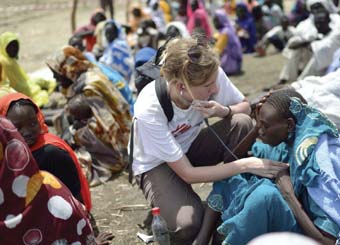The University of Valencia and Doctors Without Borders inaugurated on Friday the course 'Humanitarian Medicine: Assistance of Doctors Without Borders in precarious contexts'. The Dean of the Faculty of Medicine and Dentistry, Federico Pallardó, opens the first edition of this course, which it is provided first-hand information to the students through MSF professionals with extensive and solid experience in humanitarian medicine. More than 100 students have already signed up for the course.
Humanitarian action is a gesture from civil society to civil society, from person to person, whose purpose is to preserve life and alleviate suffering of other human beings. People affected by natural disasters, famine, war and displacement, or those who have forgotten diseases or live situations of suffering that can endanger their lives. In contexts like that, the medical assistance is the most direct way to assist these people. Humanitarian medicine is the set of knowledge and practices framed in different disciplines that responds to the health needs of these people.
MSF was born in December 1971 in the hands of a group of doctors and journalists, some of them frustrated because the mandate of the organization they worked prevented them testify on the genocide of the Ibo in Biafra (Nigeria, 1968 ), others by the inefficiency with those flood victims of 1970 in East Pakistan (now Bangladesh ) were assisted: they advocated an independent of political or economic interests medical action, which was able to come where the victims of emergencies required it to provide assistance and testimony. More than 40 years later, the goal remains the same: to preserve life, alleviate suffering and restore the dignity of people in periods when their survival is threatened. They work from principles such as independence, neutrality, non-discrimination and convictions such as professionalism, innovation and transparency. At the same time, MSF provides testimony on the status of the populations aided, publicly exposing the responsibilities of those who cause crises, and those who can influence or those who have the primary responsibility for responding.
"Doctors without Borders consider an intrinsic part of his work to publicise the realities experienced by those populations we attend. With this course we want to bring these facts to the university community, through people who have been students of the University of Valencia and now work with the organization in situ", explains the MSF delegate in Valencia, Milagros Font.
MSF has 4.6 million members and collaborators around the world, 600.000 of them in Spain, what reflects that more than 90 % of the funds of the organization are of private origin. In the city of Valencia have 16,574 members and collaborators of a total of 32,604 in the province of Valencia (51,003 in Valencian Community).
Last update: 25 de october de 2013 10:53.
News release




















